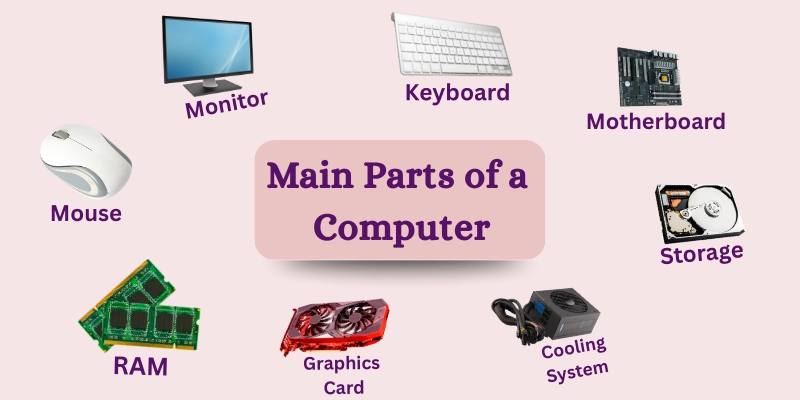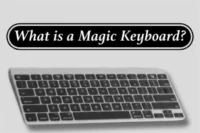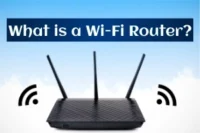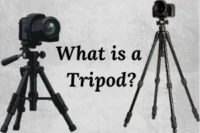Main Parts of a Computer Explained in Simple Words
Published: 3 Sep 2025
When you look at a computer, you might see a screen, a keyboard, and a mouse. But do you know what the most important parts are? Every computer has a few main parts that help it work properly.
These parts include the monitor, CPU, keyboard, mouse, and sometimes speakers or a printer. Each part has a special job. If you learn about the main parts of a computer, it becomes much easier to understand how a computer works.
In this guide, we’ll learn about the main parts of a computer.
Understanding the Computer
A computer is an electronic machine that follows our instructions. It helps us type, draw, listen to music, and even watch videos. When we understand how a computer works, we can use it better at school, at home, or at work.
- A computer has main parts like the monitor, keyboard, CPU, and mouse.
- We can use computers for studying, working, playing games, and more.
- There are different types of computers, like desktops, laptops, and tablets.
- Programs like MS Word or Paint help us do different tasks.
- Computers connect to the internet to browse websites or send emails.
Why Knowing Computer Parts Is Important?
Knowing the parts of a computer helps us use it the right way. When we understand what each part does, we can fix small problems and work faster. It also makes learning new things on the computer easier and more fun.
- It helps us know how to turn on, shut down, and use tools properly.
- We can solve simple issues without asking for help.
- We understand how programs and parts work together.
- We can choose the right computer by knowing what parts we need.
- Makes us feel more confident while using or teaching computers.
Components of a Computer
A computer has many parts that work together to help it run properly. Some components, such as the monitor, keyboard, and mouse, help us interact with the computer, while others, like the CPU, RAM, and hard drive, work internally to process and store data.

Here are some main parts of a computer.
- Monitor: The monitor is the screen that shows us text, pictures, and videos from the computer.
- Keyboard: The keyboard helps us type words, numbers, and give commands to the computer.
- Mouse: The mouse lets us move the pointer and click to open or select things on the screen.
- CPU: The CPU is the brain of the computer that does all the thinking and work.
- Motherboard: The motherboard is a big board that connects all parts of the computer so they can work together.
- RAM: RAM is a memory that helps the computer work fast when we open or run programs.
- Hard Drive: The hard drive is where all our data, files, and software are stored for long-term use.
- Power Supply: The power supply gives the right amount of electricity to all computer parts to make them work.
- Graphics Card: The graphics card helps the computer show clear pictures, videos, and games on the screen.
Input Devices
Input devices are the tools we use to give commands or information to the computer. They help us tell the computer what to do. Common input devices include the keyboard, mouse, microphone, and scanner.
Here are some input devices.
- Keyboard: We use the keyboard to type letters, numbers, and symbols into the computer.
- Mouse: The mouse helps us move the pointer and click on different things on the screen.
- Microphone: We use the microphone to speak into the computer and give voice input.
- Scanner: The scanner helps us copy paper documents and pictures into the computer.
- Webcam: The webcam lets us capture live videos or pictures and send them to the computer.
Output Devices
Output devices show us the result of what the computer does. They take the work done by the computer and give it to us in a way we can see, hear, or feel. Common output devices are a monitor, a printer, speakers, and a projector.
Here are some output devices.
- Monitor: The monitor shows text, pictures, and videos from the computer.
- Printer: The printer gives us a paper copy of documents or images.
- Speakers: Speakers let us hear sounds, music, and voices from the computer.
- Projector: The projector shows the computer screen on a wall or a big screen.
- Headphones: Headphones let only one person hear the sound from the computer.
Internal vs External Parts
Computers have both internal and external parts. Some parts work inside the computer, and some are outside that we can touch and see easily.
Here are two parts of a computer.
- Internal parts
- External parts
Let’s explain them in detail.
Internal Parts
Internal parts are the parts that stay inside the computer case. These parts do the main work, like running programs and saving files.
- The CPU is the brain of the computer that controls everything.
- RAM helps the computer work fast and run more than one task.
- A hard drive stores all our data, like pictures, videos, and files.
External Parts
External parts are the parts that we use with our hands. These parts are outside the computer and help us give input and see the output.
- The monitor shows us what the computer is doing.
- The keyboard helps us type letters and numbers.
- The mouse lets us click and move things on the screen.
How do these Parts Work Together?
All computer parts work together to help the computer run smoothly. Internal and external parts need each other to complete tasks properly.
- When we type on the keyboard, the CPU reads the input and shows it on the monitor.
- If we click something with the mouse, the CPU understands the action and opens it.
- The RAM helps the computer do all this quickly without slowing down.
- The hard drive stores the files, and the monitor helps us see what’s inside.
- The power supply gives energy to all the parts so they can work together.
Real-Life Example
When we do a simple task on a computer, many parts work together at the same time. Let’s see how internal and external parts help in writing a story.
- You use the keyboard to type words and the mouse to open the writing app.
- The monitor shows each letter and word as you type.
- The CPU reads your typing and sends it to the screen.
- The RAM keeps typing fast and smoothly without any delay.
- The hard drive saves your story so you can open it later.
- The power supply keeps everything working by providing power.
Tips to Take Care of Computer Parts
Taking care of computer parts helps them last longer and work better. We should keep both internal and external parts clean and safe.
- Always keep the computer in a clean and dry place.
- Don’t eat or drink near the keyboard or mouse to avoid damage.
- Clean the screen and keyboard gently with a soft cloth.
- Make sure the CPU has proper airflow so it doesn’t get too hot.
- Use a UPS or stabilizer to protect the computer from power cuts or surges.
- Keep the computer away from dust to protect internal parts.
- Shut down the computer properly after use to avoid problems.
- Install antivirus software to keep the system safe from viruses.
Conclusion
In this guide, we’ve learned about the components of a computer. The main parts of a computer work together to help it run smoothly. The monitor shows what you do, the CPU controls everything, the keyboard and mouse let you give commands, and the storage saves your work.
When you understand these parts, you can use the computer more easily and fix small problems yourself. Learning about them is the first step to becoming confident with computers.
Now that you know the main parts of a computer, keep learning and discover how each part helps your computer work better!
Have something to add? Drop your thoughts in the comment box below!
FAQs
Got questions on mind? Find the answers below in the FAQs section!
No, a printer is not a main part of a computer. It is an output device that prints text or pictures from the computer onto paper. The main parts of a computer are the CPU, monitor, keyboard, and mouse. A printer is helpful, but not necessary for the computer to work.
All the parts of a computer are connected through the motherboard. It is the main circuit board that lets the CPU, memory, input, and output devices work together. Wires and ports also help connect parts like the keyboard, mouse, and monitor.
Yes, a computer can work without a keyboard or mouse, but it depends on the task. Touchscreen computers, like tablets, can be used by touching the screen. Some people also use voice commands or special tools. However, for typing or clicking, a keyboard or mouse is usually needed.
The Power Supply Unit (PSU) is the part of a computer that gives power to all other parts. It takes electricity from the wall and changes it into a form the computer can use. Without the PSU, the computer cannot turn on or work. It is usually found inside the computer case.
A graphics card helps the computer show pictures, videos, and games clearly on the screen. It makes images look better and run smoother, especially in games or design work. It is very useful for video editing, 3D work, and gaming.
A cooling fan in the CPU helps keep the computer cool while it is working. It pushes out hot air and brings in cool air to protect the processor. Without it, the CPU can get too hot and slow down or stop. The fan keeps the computer running safely and smoothly.
Yes, a laptop can have the same parts as a desktop computer, but in a smaller form. It has a screen, keyboard, touchpad (works like a mouse), CPU, memory, and storage. All parts are built into one compact body. Laptops are easy to carry and work just like desktops.
HDD (Hard Disk Drive) and SSD (Solid State Drive) are both used to store data in a computer. HDD has moving parts and is usually slower, while SSD has no moving parts and works much faster. SSDs also use less power and last longer than HDDs.
The operating system, like Windows, is stored in the computer’s storage drive. This can be an HDD (Hard Disk Drive) or an SSD (Solid State Drive). The computer reads the operating system from this part when it starts up.
RAM (Random Access Memory) helps a computer do tasks quickly while it is turned on. It stores the data and programs the computer is using right now. More RAM means the computer can work faster and handle more tasks at once.

- Be Respectful
- Stay Relevant
- Stay Positive
- True Feedback
- Encourage Discussion
- Avoid Spamming
- No Fake News
- Don't Copy-Paste
- No Personal Attacks

- Be Respectful
- Stay Relevant
- Stay Positive
- True Feedback
- Encourage Discussion
- Avoid Spamming
- No Fake News
- Don't Copy-Paste
- No Personal Attacks





